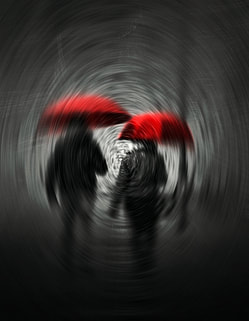
It is fear based and is a predictable set of qualities and behaviors that grows out of feeling anxious and therefore hyper-vigilant in our intimate relationships.
Many children in dysfunctional families, those children who became caretakers and pleasers in their family, became adept at reading the behavioral cues of those around them.
Mostly to remain safe.
Their very survival depended on scanning the
environment accurately for signs of danger.
Many children lost touch with their own feelings, thoughts and needs, also into their adulthood. The coping in childhood that was formed becomes the coping one uses as an adult.
"Our scanning is tied in with our fear response, which is tied in with our survival response.
We get scared, we freeze, we scan. It is the co-dependent dance."
Often in codependency we become attracted to emotional qualities in others that we have had to disown in ourselves. The characteristics that attracted us are often the qualities that anger us later when we seek to control and fix the behaviors that attracted us in the first place.
In a couples relationship one member who has grown up over functioning as the caretaker in his or her family of origin is often attracted to the individual who becomes childlike or dependent in the relationship. Each member of the dyad is thinking "love at first sight" however by over functioning, one member of the relationship can teach to other to under function.
It is the individual who has the volume knob turned up on high to care take and no longer has control over the volume. They focus on the needs, feelings, and expectations of others to the exclusion of their own needs, and are more often than not attracted to those who "need them."
In return for the caretaking, the dominant codependent partner has unstated expectations and wants their partner to read their minds, body language and make assumptions as they had attempted to do for their partner.
Once this does not occur, the over functioning codependent complains their needs are never met and their partner does not do his/her share. The over functioning codependent often feels they have no one to lean on, feel very alone and unloved. Both codependents, the over functioning and under functioning have trouble taking care of their emotions and requesting their emotional needs to be met.
For the codependent, the over functioning behavior is a defense against anxiety.
This behavior, which was perfected in childhood, allows the individual to become "other focused" thereby escaping focus on self and their emotions.
It is a defense against feeling and coping with those feelings.
Rigidity exists because over functioning is not just a bad habit, it is a misguided attitude or overzealous wish to be helpful or a behavior pattern caused by living with it chronically. That under functioning individual in their childhood is often an alcoholic. It is also a pattern of managing anxiety that grows out of our experience in our first family and has deep roots in prior generations as well.
Healing is possible.
There is a saying, "short term pain is long term gain."
Undoing some core beliefs, discomfort in identifying needs and the vulnerability in asking for those needs to be met towards healing can be a painful process, however the rewards of leading a life that is free from the chains of the past is worth the hard work.
Taken from the book, "After the Tears"
Middelton-Moz & Dwinell
 RSS Feed
RSS Feed
